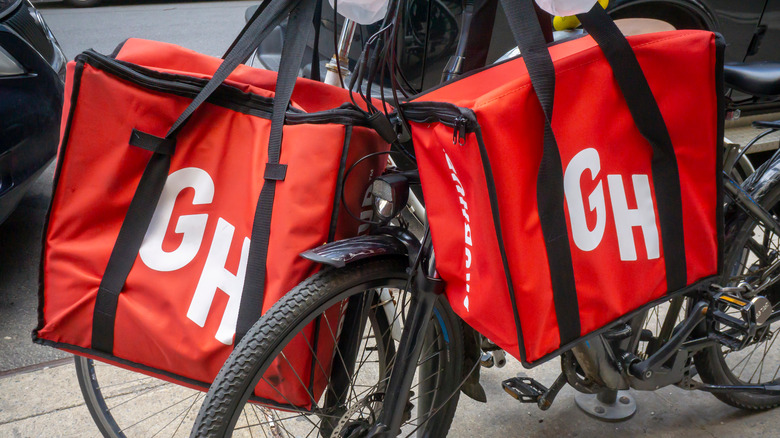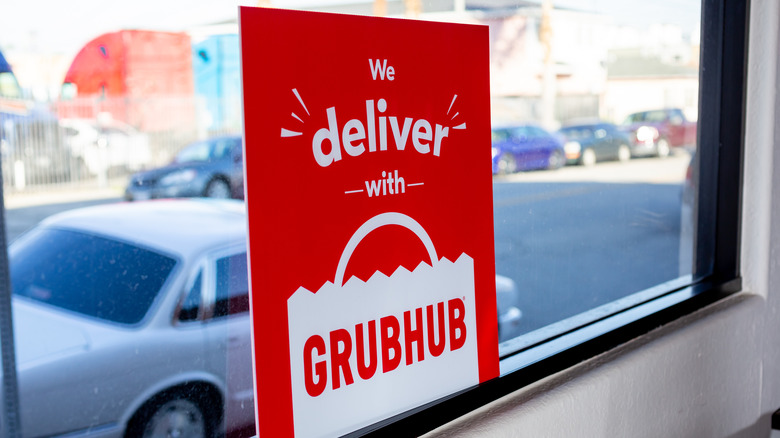Why Washington DC Is Suing Grubhub
At its height, COVID had many locked down in their homes, ordering groceries and dreaming of their favorite restaurant dishes. Enter food delivery services, which have more than tripled their worth since 2017, becoming a marketplace worth more than $150 billion. During this time, some ordering platforms haven't exactly operated on the up and up, and one is discovering that those practices may come with consequences, as the attorney general of Washington D.C. announced in a press release that Grubhub is being sued for questionable business practices.
Attorney General Karl A. Racine is suing Grubhub for deceptive advertising and charging undisclosed fees to consumers and restaurants during the pandemic. In addition to delivery fees, Grubhub also charged customers a "service fee" that was hidden with tax charges at checkout. The delivery service also advertised free online ordering, but omitted that the deal only applied to pick-up orders; customers who opted for delivery still paid a fee. It also promoted "unlimited free delivery" for Grubhub+ subscribers but didn't mention that a service fee was included on all deliveries.
Grubhub's bad business practices didn't stop at false advertising, though, and restaurants paid a price for working with them.
How Grubhub bites the hand that feeds it
As if restaurants weren't hit hard enough by closures and a lack of customers thanks to COVID-19, the food delivery services that were supposed to keep them in business instead ate up their profits, according to CNN. Margins in the food industry are notoriously tight, and with third-party delivery services charging establishments up to 30% per order, there was little leftover for restaurants. (Eater reported in early 2021 that multiple states were working to cap those fees at 15% for at least the duration of the pandemic.) A press release from the attorney general of Washington D.C. states Grubhub implemented additional questionable practices that hurt restaurants.
Grubhub in Washington D.C. listed "thousands of D.C. restaurants" on its website without authorization, falsely leading consumers to its platform. The delivery company listed "deceptive 'routing' phone numbers" that earned it a commission when used, and also from 2011 to 2018 also created "fake websites" that featured restaurant names, logos, and contact information. When customers moved to place a delivery order, the site would redirect them to Grubhub.
Perhaps worst of all, Grubhub ran a promotion called "Supper for Support" in March and April 2020 that offered customers a discount for supporting local eateries during the pandemic. Instead of paying the full difference, it passed most the cost on to the very restaurants it was said to be helping. Attorney General Racine said, "With this lawsuit, we are seeking to force Grubhub to end its unlawful practices and be transparent so D.C. residents can make informed decisions about where to order food and how to support local businesses."
Grubhub responds
Grubhub sent Tasting Table a statement responding to the accusations in the lawsuit filed by Washington D.C. Attorney General Karl A. Racine. In it, the company wrote it "sought to engage in a constructive dialogue with the D.C. Attorney General's office," and is "disappointed they have moved forward with this lawsuit." Grubhub states it plans to "aggressively defend our business in court and look forward to continuing to serve D.C. restaurants and diners."
The statement addresses specific allegations, asserting that Grubhub does not list restaurants on the platform without authorization; discloses any fees and charges in its Terms of Use; makes it clear some telephone numbers are for "order assistance" through language on the website, as well as by having the Grubhub representative who fields the call inform the customer of this affiliation; and that any restaurants involved in the "Supper for Support" promotion were aware of the terms and not forced to participate. Grubhub stated that it no longer creates websites for restaurants, and that it has "transferred domains to any restaurant requesting such a transfer at no cost to them."
The delivery platform also wrote that, moving forward, it will disclose fees and charges more clearly: at check-out, in emails, and on advertisements; and will include a disclosure on advertisements for promotions which are funded by the restaurants, not the platform itself.


